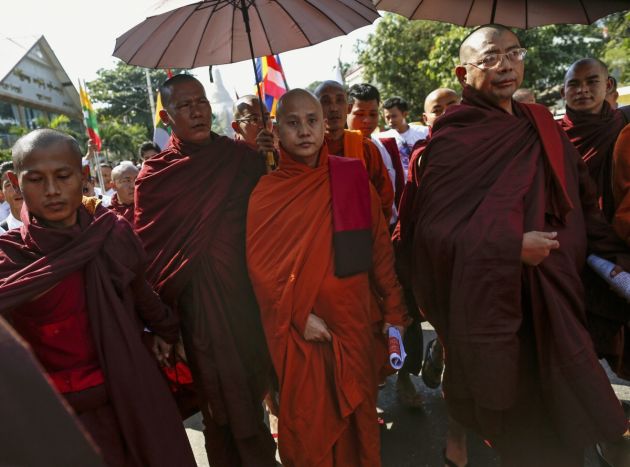Myanmar called to charge or release detained Kachin Christians

The plight of those from religious minorities in Myanmar has long been dire for Rohingya Muslims, but this week Human Rights Watch has spoken out on the detention of two ethnic Kachin Baptist leaders.
"Burmese authorities should immediately release or appropriately charge two ethnic Kachin Baptist leaders arbitrarily detained by the military since Dec. 24, 2016, Human Rights Watch and Fortify Rights have said.
They said Jan. 23 that the military in Northern Shan State should urgently transfer Langjaw Gam Seng, 35, and Dumdaw Nawng Lat, 65, to police custody so that they are no longer at risk of abuse by military personnel.
After the report on the Christians, the United Nations Special Rapporteur on the situation of human rights in Myanmar, Yanghee Lee, warned about possible reprisals against people she met during her recent official visit to the country (Jan. 9 to 21), also in Kachin state.
"There is one word that has hung heavily on my mind during this visit – reprisals," the expert said.
In its release HR Watch said the Baptist leaders went missing after being called to a military base, apparently linked to their assisting journalists investigating an unlawful military airstrike.
On Jan. 19, the military published a statement on Facebook acknowledging their arrest and detention, and alleging that the two had been providing various forms of support to the Kachin Independence Army (KIA).
NO CHARGES FILED BY THE MILITARY
In the month since their arrest, the military had not filed charges, turned them over to civilian authorities, or provided them access to lawyers or family members, as required by Burmese and international law.
"The arrest of the two Kachin Baptist leaders appears to be retaliation for their help in exposing wartime abuses," said Matthew Smith, chief executive officer of Fortify Rights.
"The military came clean about their detention only after local and international outcry, but they're are still at grave risk."
The military in its statement alleged that Langjaw Gam Seng, a youth leader with the Kachin Baptist Convention (KBC), and his cousin Dumdaw Nawng Lat, an assistant KBC pastor, acted as the "financial supporter, informer, recruiter, rumor monger" for the Kachin Independence Army.
The statement said that Dumdaw Nawng Lat "gave information about movements of Tatmadaw [Burmese Army] columns and financial support to the insurgents and spread slanderous news and propaganda by having links with outside media in order to mislead the local and international communities." Langjaw Gam Seng allegedly "gave information about the Tatmadaw to KIA insurgents, recruited new members, and transported fuel for smooth transport of insurgents during the battles."
Government leaders are responsible for the safety and security of these two men and should ensure lawyers and family have immediate access, said HR Watch.
"The government needs to act now to ensure that these men are urgently transferred out of the darkness of military detention where they're highly vulnerable to abuse," said Phil Robertson, deputy Asia director at Human Rights Watch.
"Government leaders are responsible for the safety and security of these two men and should ensure lawyers and family have immediate access."
In Geneva Yanghee Lee, said, "I am deeply concerned about those with whom I met and spoke, those critical of the Government, those defending and advocating for the rights of others, and those who expressed their thoughts and opinions which did not conform to the narrative of those in the position of power."
She noted the use of section 66 (d) of the Telecommunications Law against many, "merely for speaking their minds."
"It is particularly alarming to learn that the security forces' counter operations in the villages of Maungdaw north in Rakhine State has reportedly been resumed following a brief lull, with raids conducted in several villages including nearby the villages I visited," Lee stressed. There are further allegations of arbitrary arrests and detention in relation to these latest reported raids.
The expert was especially dismayed to note during this visit the feelings of optimism and hope appearing to slowly fade among the ordinary people of Myanmar just after one year when the whole country was elated with the outcome of the last general elections.
The Special Rapporteur expressed regret at only being allowed to go to Myitkyina, and not Laiza and Hpakant in Kachin State due to security reasons and met interlocutors who travelled to Myitkyina instead.
"It is evident that the situation in Kachin and at the northern borders is deteriorating, she stated. "Those in Kachin State tell me that the situation is now worse than at any point in the past few years. "Whilst I was not able to travel to the areas most severely affected, the situation is now such that even in Myitkyina, the capital of the state and home to over 300,000 people, residents are afraid – and now stay home after dark."